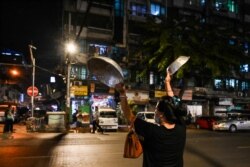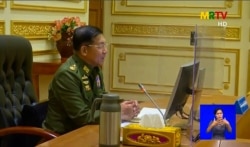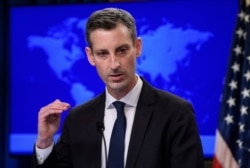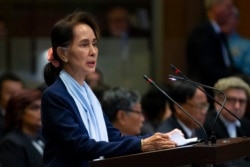Myanmar’s military government blocked public access to Facebook Thursday amid growing popular resistance to this week’s overthrow of the country’s civilian government.
The Ministry of Communications and Information issued a statement saying the social media giant would be blocked until Sunday in order to keep “stability” in the country.
Telenor Myanmar, the country’s leading mobile network operator, confirmed it had been ordered to block Facebook, but said it “does not believe that the request is based on necessity and proportionality, in accordance with international human rights law.”
The U.S.-based company urged Myanmar’s military leaders to “restore connectivity” in order to ensure citizens “can communicate with family and friends and access important information.”
Facebook is the most popular social media platform in Myanmar, used by civilians and military leaders alike.
People in Myanmar angry over the takeover have taken to Facebook to post images and livestream various protests. Residents in Yangon and other cities have taken to the streets for two consecutive nights to bang on pots and pans and honk car horns to protest the coup.
Growing condemnation
The U.N. Security Council, which often struggles to reach consensus, issued a united statement Thursday expressing “deep concern” at the declaration of the state of emergency imposed by the military. The 15-members, which include Myanmar’s patron, China, also called for the release of Aung San Suu Kyi, President Win Myint and others who have been detained.
“The members of the Security Council emphasized the need for the continued support of the democratic transition in Myanmar,” said council president Ambassador Barbara Woodward of Britain in reading out the statement. “They stressed the need to uphold democratic institutions and processes, refrain from violence, and fully respect human rights, fundamental freedoms and the rule of law.”
Early Friday, Win Htein, a key aide of Aung San Suu Kyi, “was arrested at his daughter’s home” and being driven from Yangon to Naypyidaw, NLD spokesperson Kyi Toe wrote on Facebook, according to media reports.
The council also called for safe and unimpeded humanitarian access to all people in need, including through the re-establishment of U.N. relief flights, which the military said are suspended with all other flights into and out of the country, through the end of April.
On Wednesday, U.N. Secretary-General Antonio Guterres said the coup was “absolutely unacceptable” and the United Nations would work to mobilize key international actors to pressure Myanmar “to make sure” it fails.
Myanmar’s military, the Tatmadaw, seized power Monday, declaring a yearlong state of emergency and detaining Suu Kyi and Win Myint, among others.
The coup took place following days of tension between the military and the ruling National League for Democracy (NLD), which won the November elections. The Tatmadaw has refused to accept the results, alleging massive election fraud.
Suu Kyi held for 2 weeks
On Wednesday, Myanmar authorities filed charges against Suu Kyi for allegedly illegally importing and using six unregistered walkie-talkie radios found during a search of her home in the capital, Naypyitaw.
Her NLD Party said that she has been ordered held for two weeks. They also said the authorities had raided party offices in multiple regions of the country.
Win Myint was separately charged with violating coronavirus containment measures while campaigning for last November’s election.
In Washington, State Department spokesman Ned Price said the U.S. is “disturbed” by reports of the new charges and called for the military to release all those detained.
Troubled history
Myanmar, also known as Burma, has long struggled between civilian and military rule, but until the coup had been enjoying a hopeful transition to democracy.
A British colony until 1948, the country was ruled by military-backed dictators from 1962 until 2010.
An uprising in 1988 pushed for an election in 1990, which the NLD won in a landslide. But the elected members of Parliament were imprisoned, and the dictatorship continued.
Suu Kyi, the daughter of Myanmar's assassinated independence hero, Gen. Aung San, emerged as a leader in the pro-democracy rallies and in the NLD. She was awarded the Nobel Peace Prize in 1991 while under house arrest.
In 2010, Senior Gen. Than Shwe announced the country would be handed over to civilian leaders, who included retired generals. They freed political prisoners, including the lawmakers from the NLD, and Suu Kyi, who was elected in a 2012 by-election and later became the state counsellor of Myanmar.
While popular among Myanmar’s Buddhist majority, Suu Kyi, 75, has seen her international reputation decline over her government’s treatment of the country's mostly Muslim Rohingya minority.
In 2017, an army crackdown against the Rohingya, sparked by deadly attacks on police stations in Rakhine State, led hundreds of thousands of them to flee to neighboring Bangladesh, where they remain.
The International Criminal Court is investigating Myanmar for crimes against humanity.
VOA's Richard Green, UN correspondent Margaret Besheer and State Department correspondent Nike Ching contributed to this report.









